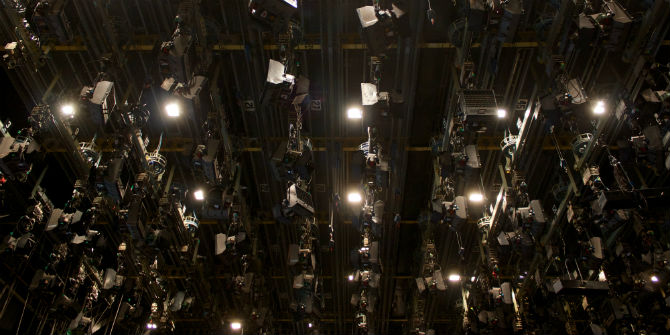

 As countries including the UK consider whether to formalise the holding of televised debates in the run up to elections, it is useful to look at the role that they currently play in elections elsewhere and whether or not they are still valuable. Swansea University’s Richard Thomas, Allaina Kilby and Matthew Wall look here at the relevance of the US Presidential debates taking place in advance of the election on 3 November. A series of debates between candidates have taken place in the run up to each presidential election in the US since 1976 (and before that in 1960), organised by the non-partisan non-profit Commission on Presidential Debates since 1987.
As countries including the UK consider whether to formalise the holding of televised debates in the run up to elections, it is useful to look at the role that they currently play in elections elsewhere and whether or not they are still valuable. Swansea University’s Richard Thomas, Allaina Kilby and Matthew Wall look here at the relevance of the US Presidential debates taking place in advance of the election on 3 November. A series of debates between candidates have taken place in the run up to each presidential election in the US since 1976 (and before that in 1960), organised by the non-partisan non-profit Commission on Presidential Debates since 1987.
The focus on an increasingly unpredictable and chaotic Presidential campaign has inevitably switched to the televised debates. In the wake of potentially damaging revelations about Donald Trump’s tax affairs, polls suggest that he came off second best in a very scrappy first debate with Joe Biden. Then news broke that the President was hospitalised after testing positive for COVID-19, and his general health and recovery were questioned. The attention then switched to his running mate Mike Pence and his debate with Democratic opponent Kamala Harris. After all, if Trump’s condition were to deteriorate then Pence might be playing a much bigger role in the future.
Pence and Harris produced a more orderly contest than the chaotic display put on by the presidential candidates, featuring fewer interruptions and more policy discussion, despite headlines being bizarrely hijacked by the fly that landed on the Vice President’s head.
In another twist, after the Commission on Presidential Debates (CPD) determined that the next Trump-Biden head to head would be an online affair, the President announced that he wouldn’t participate on the basis that the whole idea was “ridiculous” and that the moderator could “cut you off whenever they want”. The second debate was then cancelled, and the clear reluctance of Trump to take to an online platform to debate, combined with the safety concerns of a face-to-face interaction have led to uncertainty not just over the format and schedule of the this year’s debates, but also about the future of Presidential debates altogether.
In a series of weekly podcasts, funded by Cherish Digital Economy Research Hub at Swansea University, we are analysing the wider 2020 campaign, drawing on academic research and media and market analysis. While the first televised debate was clearly newsworthy and headline grabbing, there is compelling evidence showing that these televised contests matter little to voters.
From an historical perspective, the debates have almost certainly played an important role. In the first televised presidential election debate in 1960, a tanned, relaxed and urbane Senator John F. Kennedy met a pale and weary Vice President Richard Nixon. Studio lights, melting make up and an ill-fitting and ill-advised choice of suit combined to create a perfect storm, and Nixon was done for. One observer remarked that it appeared that he’d been embalmed “before he even died.” Commentators considered that contest to be the turning point in the campaign.
The appearances of two white men aged 74 and 77 could also be key in 2020 given the continuing jibes from both sides doubting the other’s physical and mental wellbeing. Given Trump and his wife’s positive COVID tests and his wider family’s refusal to wear face masks in the studio when asked to do so, the first debate might yet prove to be of critical importance to the health of those coming into contact with them, especially in light of the increasing number of COVID cases within the Trump camp.
These debates deliver the ultimate in drama and theatre for the US electorate and are providing seemingly endless content for the hungry news and entertainments industries. Interestingly, the late-night TV comedy circuit has been a more sombre affair of late, as hosts like Stephen Colbert and Seth Meyers left behind their satirical approach for some more straightforward and serious commentary about the state of American democracy, to remind their audiences of the importance of voting.
However, as mentioned above, in terms of influencing voters and election results, these debates might not be so important. In 2016, Hillary Clinton was ahead in every meaningful poll following each TV debate, but of course the final election result did not reflect this lead. Betting markets, perhaps a more realistic measure of public opinion as bookmakers have more to lose than pollsters if they get it wrong, also point to the debates mattering less than we might think. There was significant movement, for example, in punter confidence towards Democratic candidate John Kerry in 2004 when George W. Bush allegedly (though it was never proven) wore an earpiece to assist with his answers. Barack Obama overcame his “rookie” status to attract the gamblers’ dollars in 2008, but this support deserted him in 2012 when he produced a sub-par performance against Mitt Romney in 2012.
Hillary Clinton found favour on the betting markets as well as the pollsters in 2016, and now, following the positive COVID-19 tests, some bookmakers in the UK, including Ladbrokes and William Hill, stopped accepting bets, with Biden well ahead. But the overall impact of how candidates perform in the debates themselves must be questioned given that the supposed “winners” with the bookies in 2004, 2008 and 2016 did not go on to win the race for the White House. As a consequence, and despite his clear lead in the betting markets and the polls, Joe Biden and his supporters are not showing any obvious signs of complacency. Indeed, following the debate with Pence in Utah, Kamala Harris tweeted a message thanking Democrat supporters for all that they’d done to help so far, but also reminded them that with just 27 days to go, “every dollar counts”.
Finally, those doubting the value of impact of the debates might suggest that there are simply fewer voters left to convince. The ideologies underpinning the candidates and their personal traits mean there has been an ongoing process of political polarization in the US – this process turning “independent and detached voters” into “loyal party supporters”. The number of so called “swing voters” has been in decline for decades, and now averages less than 10% of those eligible to vote. Furthermore, over 6.6 million US citizens people have already submitted their postal votes – ten times more than at this stage in 2016.
One thing seems certain though. If the debate planned for 22 October takes place at all, whether online or face-to-face, and whether they actually matter or not, even for those who to this point have taken an ambivalent interest in the campaign, these televised contests are compulsive, if often excruciating viewing.
The weekly podcasts are available via Apple Podcasts or Spotify.
This article represents the views of the authors and not the position of the LSE Media Policy Project, nor of the London School of Economics and Political Science.



